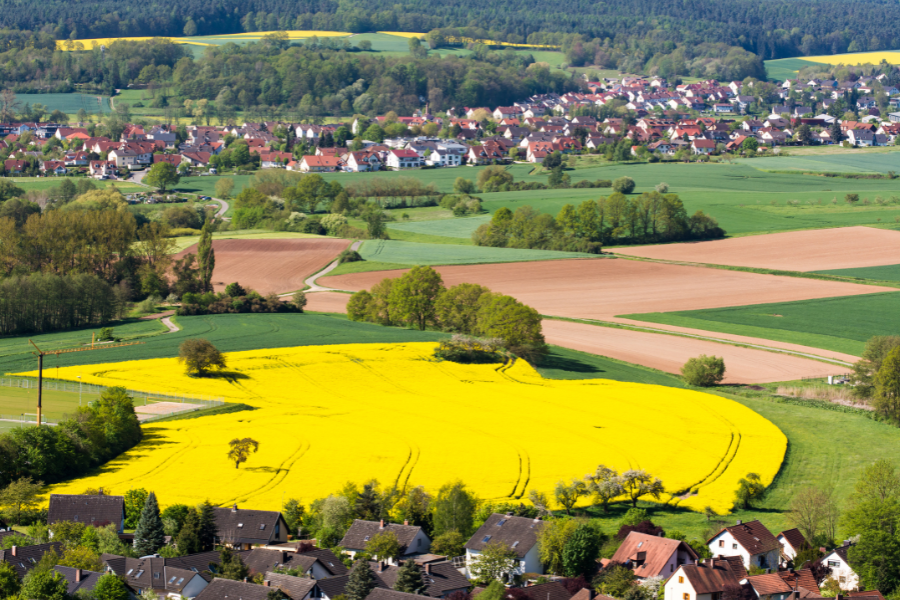Blog
Rural and Remote Communities are Essential, and Entitled, to a Net-Zero Energy Transition
by Gemma Pinchin, Senior Lead, Research and Projects, QUEST Canada

Rural and Remote Communities are Essential, and Entitled, to a Net-Zero Energy Transition
When people imagine a net-zero energy future, they often only think of urban centres. But with 1 in 5 Canadians living in a rural community, today’s urban-centric energy transition leaves large swaths of Canada, and Canadians, out of the equation.
If we want to ensure a just energy transition, this won’t do.
To contribute to making sure everyone is included, QUEST Canada is undertaking research in cooperation with Canadian rural communities. We’re setting out to explore what motivations, challenges, and energy opportunities our low-density areas face as rural villages, towns and municipalities set new net-zero goals.
QUEST recently conducted a thorough, international literature review. The review identified six common themes to consider when looking at rural and remote communities and their transition to net zero.
Rural space use
Part of why rural communities are crucial to the net-zero transition, is their large, open areas of land needed for renewable energy and transmission infrastructure. Rural land also offers the opportunity for carbon sequestration, particularly in agricultural spaces, by mixing non-agricultural plants (trees and shrubs) in with agricultural ones.
But with transmission infrastructure most often housed there, outside of core population centres, rural communities must also accommodate the associated visual intrusions and environmental hazards. On top of that, rural communities are often left with high electricity costs or, in the case of remote communities, a lack of access to the grid entirely.
Rural needs
Because rural communities have different needs than their urban counterparts, viewing sustainability and the net-zero transition from an urban lens is likely to further the urban-rural divide. For example, automobiles, in an urban setting, are frequently the least sustainable option. However, in rural settings, cars and trucks are considered necessary to both access local services and keep them in local communities, with the sustainable option being combining trips to ensure fewer ones.
Similarly, rural building retrofits don’t benefit from the economies of scale available to urban buildings, as they are often older, further apart, and lack uniformity. Furthermore, rural communities face imbalances in carbon emissions and expectations. They are responsible for less carbon emissions than urban areas but are expected to deliver net-zero results on multiple fronts
Cost barriers
When considering the net-zero transition, cost barriers are a significant hurdle for rural and remote communities to overcome. Renewable energy, reforesting, and new transmission lines are all projects that require high upfront costs. Rural and remote communities often struggle to allot these funds, particularly in cases reliant on high-cost fuels, such as diesel. There is also a reluctance to change the way things are done for something novel. However, this hurdle can be overcome by significant government financial support to incentivize the changes.
Socio-economic impact
A net-zero energy transition has the potential to both create jobs in rural and remote communities and have broad socio-economic benefits for communities. Investments in net-zero projects act as a catalyst for local decision-making, allowing communities to address their unique challenges and priorities.
However, there is a risk for exploitation of rural and remote communities due to their socio-economic and political disadvantages. Because benefits of energy transition are too easily funnelled out of the community, it is important they are planned to remain local and reinvested in the community. Rural communities benefit this way equally from local infrastructure, and are able to contribute to overall sustainable initiatives through community hubs or village halls, EV charging stations, and carshare programs.
Decolonization and self determination
With many Indigenous communities reliant on diesel-generated electricity, and lacking access to the provincial grids, the legacy of colonisation is evident everywhere across Canada’s electricity system. Many well-intended renewable energy projects also lack appropriate Indigenous engagement, and are at risk of damaging Indigenous communities, lands, and cultures.
Transitioning Canadian energy systems toward net zero however, can create a positive pathway to decolonization. The opportunity offers a chance to redistribute power back into the hands of First Nation, Inuit, and Métis communities, and to decolonize our energy systems to allow Indigenous clean energy projects to contribute and their communities benefit.
Disconnection and roadblocks
Lastly, there are a number of community energy concepts or sectors that exist in disconnection from one another. This despite being interconnected in the net-zero transition. There is an obvious tension between concepts such as urban vs. rural, farming vs. forestry, and rural vs. renewables, that puts them at odds with each other. This tension must be overcome.
There are also similar disconnections between the multiple actors that inhabit the energy space. Multiple actors, or ‘too many cooks’, are creating roadblocks, slowing uptake, and lacking a shared vision. This is creating a competing and confusing landscape, within which the transition has become bogged down. A ‘whole’ government approach is needed, one where a national strategy is implemented with local knowledge and expertise.
Questions about MNZA?
Please don’t hesitate to reach out to Gemma at gpinchin@questcanada.org.
Call for Expressions of Interest
The deadline to apply is Monday, August 5, 2024, visit the webpage for more information.
S'inscrire
Rejoindre la conversation!
Inscrivez-vous pour recevoir les dernières nouvelles et mises à jour sur les événements de QUEST Canada et recevez la newsletter mensuelle de QUEST Canada.


